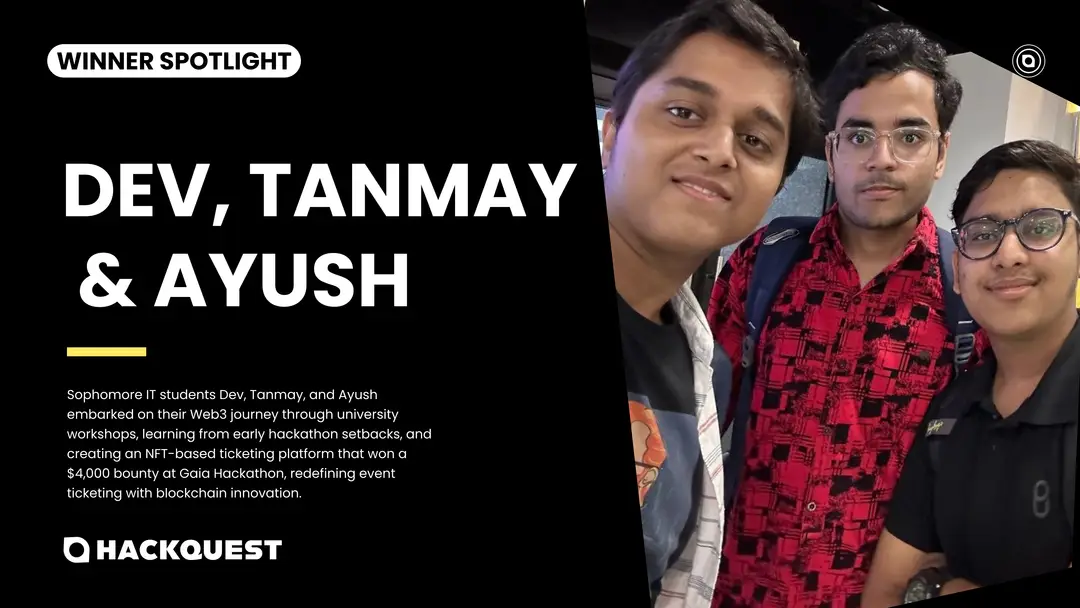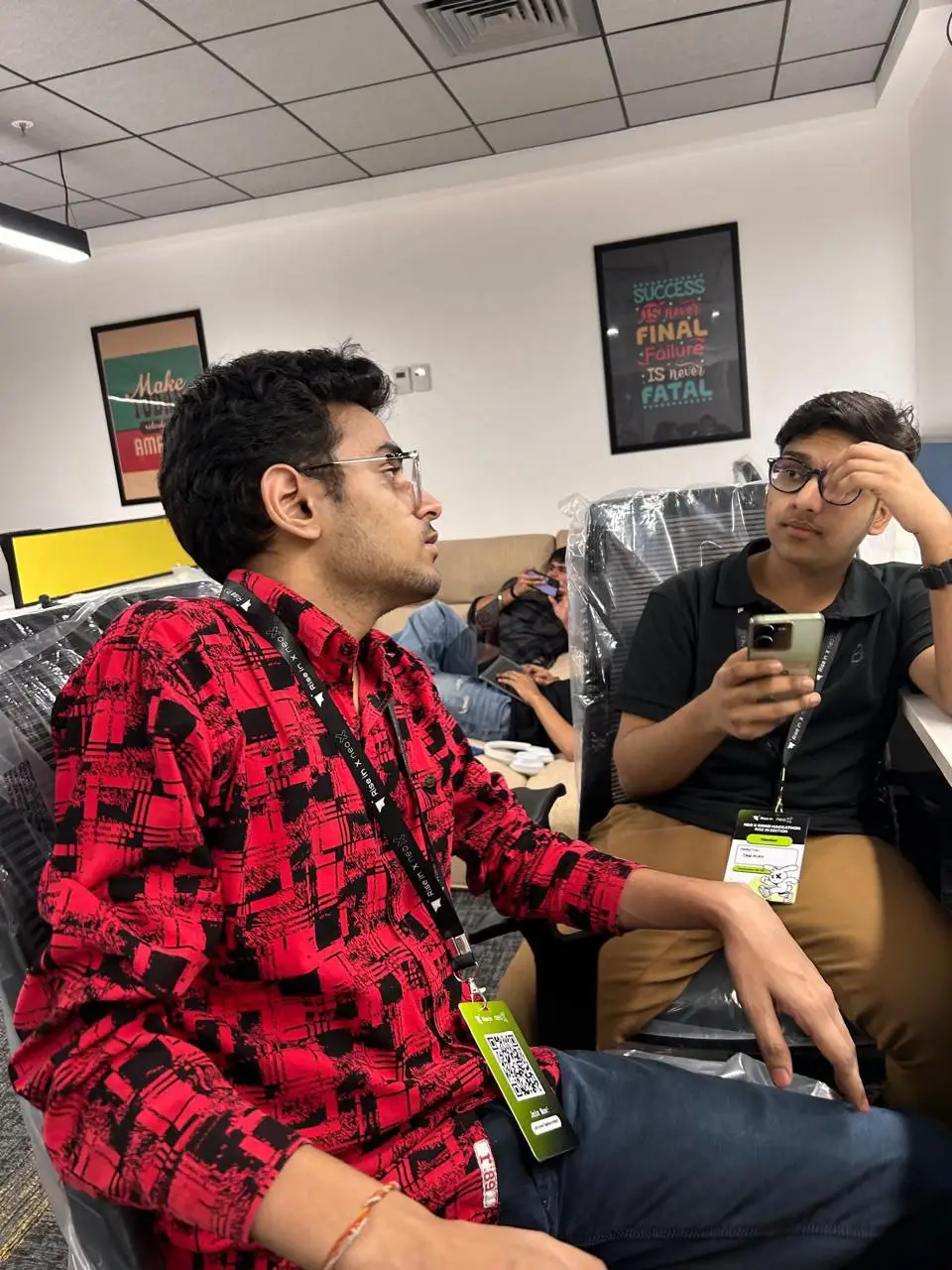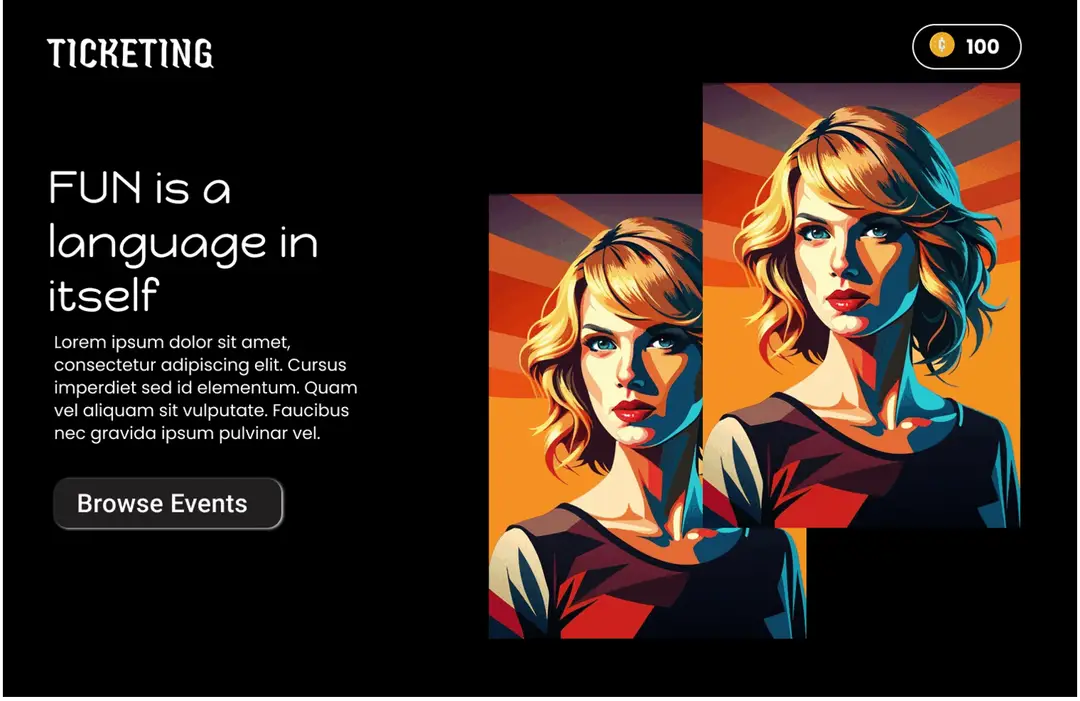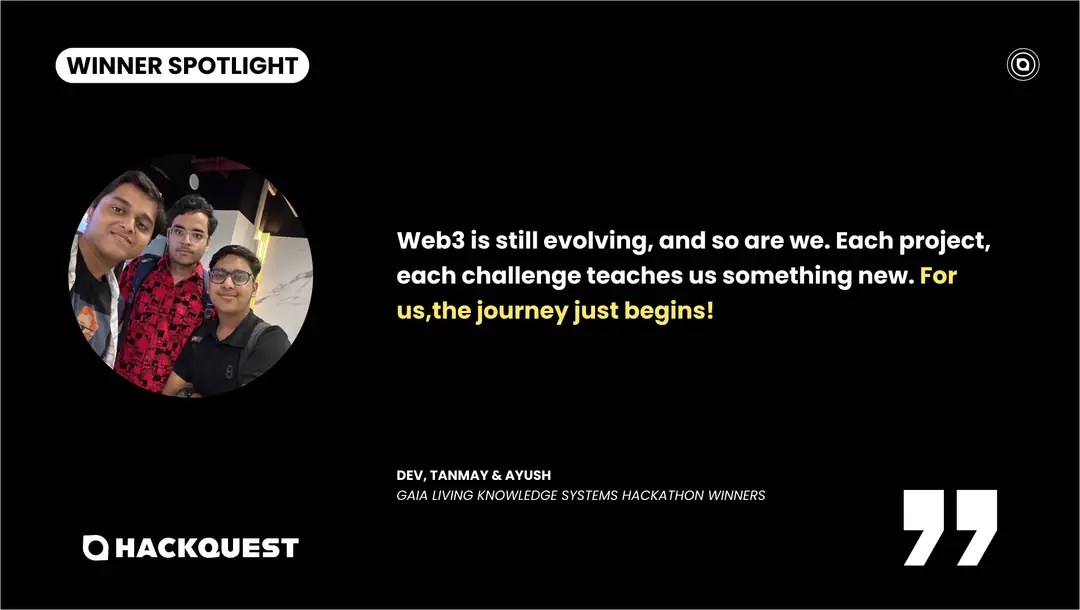Back
User Spotlight #5: Revolutionizing Event Ticketing with Blockchain and NFTs: A Team’s Path to Pioneer a Web3 Ticketing Solution
User Spotlight
By HackQuest
Nov 20,20244 min read
Background and Influences
"Watching videos on YouTube opened up an entirely new world for us. Web3 felt like a fascinating intersection of technology and creativity." – Tanmay
The trio of Dev, Tanmay, and Ayush started their Web3 journey as sophomores studying Information Technology. Each brought a unique perspective to the table:
●Dev discovered blockchain technology through university seminars and workshops.
●Tanmay found inspiration while watching YouTube videos about Web3 and its potential.
●Ayush first encountered Web3 while working on an AI project and was intrigued by its applications in decentralized systems.
Their first hands-on exposure came at a university-organized blockchain hackathon. Though they didn’t perform well, the experience piqued their curiosity and set them on a path of exploration. From there, they discovered HackQuest and decided to join its Gaia hackathon. Ayush, having prior knowledge about Gaia, became a key contributor to their progress.
🎓
We didn’t win our first hackathon, but it taught us valuable lessons about teamwork and innovation. That failure laid the foundation for our success. – Dev
Learning Journey
The group’s learning journey revolved around exploring both theoretical and practical aspects of Web3. Initially, they participated in workshops and seminars at their university, which helped them grasp basic blockchain concepts. However, it was their experiences in hackathons that solidified their understanding and skills.
✨
“Hackathons aren’t just competitions; they’re opportunities to learn, fail, and grow. Every mistake teaches you something valuable.” – Ayush
From creating small projects at local events to tackling larger, more complex ideas, the team worked together to develop their technical skills. They frequently relied on online resources to learn about decentralized systems, smart contracts, and blockchain integrations.
🗣
Want to start learning Web3 systematically? Check out HackQuest’s expert-written learning tracks 👇
Breaking into Hackathons – A Rocky Start
“Our first hackathon didn’t go as planned. We didn’t win, but the experience taught us valuable lessons about innovation and what makes a project stand out.” – Dev
Before participating in the Gaia Hackathon, the team had limited experience with hackathons. Their first attempt was at HackVortex, an event organized by JIMS College in Delhi. Despite their enthusiasm, they struggled to make an impact and ended up scoring poorly.
The hackathon's theme was centered around open innovation, which wasn’t heavily focused on Web3 concepts. The team submitted a basic escrow contract application aimed at improving interactions between freelancers and clients. However, the project lacked a unique selling point and didn’t fully capture the judges' curiosity.
“We were still new to hackathons at the time and didn’t really understand what makes a product truly stand out. We missed the mark on showcasing the innovative potential of our idea.” – Tanmay


Reflecting on this early setback, the team realized the importance of understanding a hackathon's theme, tailoring projects to meet its goals, and clearly communicating the value proposition of their ideas. While HackVortex wasn’t a win, it served as a foundational learning experience, pushing them to refine their approach for future hackathons.
💡
“That first failure was a turning point. It helped us focus on what we could do better—building unique solutions and presenting them effectively.” – Ayush
This rocky start became the motivation they needed to improve their skills, learn from mistakes, and approach their next hackathon with a more strategic mindset.
Building NFT Ticketing Project to Bridge Web2 and Web3 - Gaia Hackathon
The team’s standout project at the Gaia Hackathon was the NFT-Based Ticketing Platform, designed to address inefficiencies in the traditional event ticketing system. Inspired by Tanmay’s frustration with exorbitant ticket prices at a Coldplay concert, the team set out to develop a platform that leverages blockchain to make ticketing secure, transparent, and rewarding.

“The prices were outrageous. That’s when the idea hit—what if tickets were NFTs? They could be traceable, secure, and prevent exploitation.” – Tanmay
The Vision:
The platform aimed to revolutionize ticketing by introducing a decentralized, NFT-based system that ensures tickets are authentic, secure, and easily verifiable. It also incorporated innovative features to improve user experience and prevent common industry problems such as counterfeiting and inflated resale prices.
Key Features:
1.NFT-Based Ticketing: Each ticket is issued as a unique NFT, ensuring authenticity, traceability, and security.
2.Decentralized AI Chatbot: A blockchain-powered AI chatbot provides real-time user support while maintaining privacy and autonomy.
3.Rewards on Every Purchase: Users earn loyalty points or exclusive NFTs with every ticket purchase, redeemable for discounts or special perks.
Despite having a clear vision, building the platform came with significant challenges. Integrating the Web2 user experience with Web3’s technical infrastructure proved particularly difficult. While the smart contract itself was functional, the team faced issues connecting it with the Web2 components.
🚩
“It took 10 hours to solve what turned out to be a five-minute fix, but the process taught us invaluable lessons about troubleshooting and teamwork.” – Tanmay
Through relentless debugging and diving deep into the documentation, the team uncovered the exact function needed to bridge the two systems successfully. This was a turning point, demonstrating their ability to collaborate effectively under pressure and utilize their combined problem-solving skills.
Benefits of the Platform:
●For Event Organizers: An end-to-end secure ticketing system that prevents black-market sales and builds trust with attendees.
●For Users: A user-friendly platform that guarantees authentic tickets, rewards loyalty, and enhances privacy.
●For the Industry: A revolutionary model that sets new standards for ticketing transparency and efficiency.
The Gaia NFT project not only won the team a $4,000 bounty but also reaffirmed their passion for using blockchain to solve real-world problems. It was a testament to their resilience, creativity, and ability to think critically under time constraints.
“Web3 allows us to imagine new solutions to old problems. Projects like Gaia NFT remind us why we love being builders.” – Dev
💥
HackQuest hosts and sponsors many IRL and online hackathons with big prizes! Check out more on our hackathon page:
Advice for Builders
Drawing from their experiences, the team shared several tips for budding Web3 developers:
●Don’t fear failure. Every rejection is an opportunity to learn and improve.
●Ask questions. Even if they seem silly, seeking help can open doors to new knowledge.
●Use hackathons as learning platforms. Beyond competition, they offer invaluable experience and insights.
●Start small. Build smaller projects first to develop skills and confidence before tackling complex ideas.
●Stay curious. Platforms like Claude and ChatGPT can be great resources for learning as you build.
“Hackathons are more than competitions—they’re stepping stones for personal and professional growth.” – Ayush
The Road Ahead – Reflections and Future Goals
Looking ahead, the trio is already planning their next hackathon on the Neo blockchain. For them, Web3 isn’t just a field of study; it’s a space where curiosity meets creativity to solve real-world challenges.

Keeping up with the latest on Web3 with HackQuest: